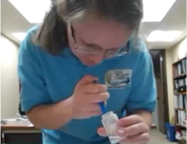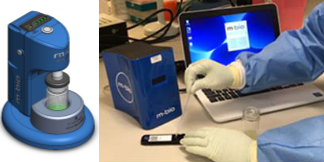A virtual workshop was convened at Bowling Green State University (BGSU), on July 23, 2020 to train regional stakeholder and volunteer groups in the operation of MBio Diagnostic’s LightDeck technology-based detection kit for the cyanotoxins microcystin and cylindrospermopsin.
The workshop was developed as part of a project, “Portable Toxin Detection Technology to Support Great Lakes Decision Support Tools,” funded by a grant awarded to BGSU (Dr. Timothy Davis, lead Principal Investigator) under NCCOS’s Monitoring and Event Response for Harmful Algal Blooms (MERHAB) Program. The project aims to improve rapid detection of cyanotoxins in the field to provide managers with timely information on risk and minimize exposure to stakeholders.

About 30 participants received instruction on sample preparation and toxin detection, and then conducted both protocols using their own grant-furnished equipment and a sample of toxic Microcystis culture distributed prior to the workshop. Participants also learned how to manage the data generated during this exercise and all actively engaged in Q&A, discussion, and troubleshooting sessions throughout the workshop.

This application of waveguide technology for algal toxin detection was initiated through fundamental research conducted by NCCOS along with Queen’s University Belfast under a Joint U.S. – Ireland Research Partnership Program that enabled MBio Diagnostics, Inc. to expand its product line to include environmental diagnostics.
The MBio field-portable multi-toxin detection platform is of one of several new products NCCOS research is transitioning for HAB monitoring that is easily transferable to, and affordable by, managers, communities, and individual users for targeted field-based toxin detection and surveillance applications.
Stakeholder groups participating in the project but unable to attend the workshop (e.g., Lake Erie Charter Boat Captains, Toledo water treatment plant) will receive direct instruction from project investigators leading into this year’s bloom season. All groups will contribute toxin monitoring data towards validation of MBio’s rapid, portable, quantitative, multiplexed cyanotoxin detection technology, in order to provide water managers with reliable on-the-spot testing of toxins posing a threat to human and animal health, as well as the regional economy.
In addition to project investigators from BGSU, MBio, NCCOS, U. Toledo, The Ohio State U., LimnoTech, Inc., and Michigan Sea Grant, representatives from several user groups participated in the training workshop: Ottawa County Regional Water Treatment Plant, Virginia Dept. of Health, Maumee Bay State Park Beach Monitoring Program, Old Woman Creek National Estuarine Research Reserve (NERR), and Imagination Station Toledo Science Center. The latter two groups are members of NOAA’s Phytoplankton Monitoring Network, which recently expanded its activity into freshwater systems with support from the U.S. EPA Office of Water.
